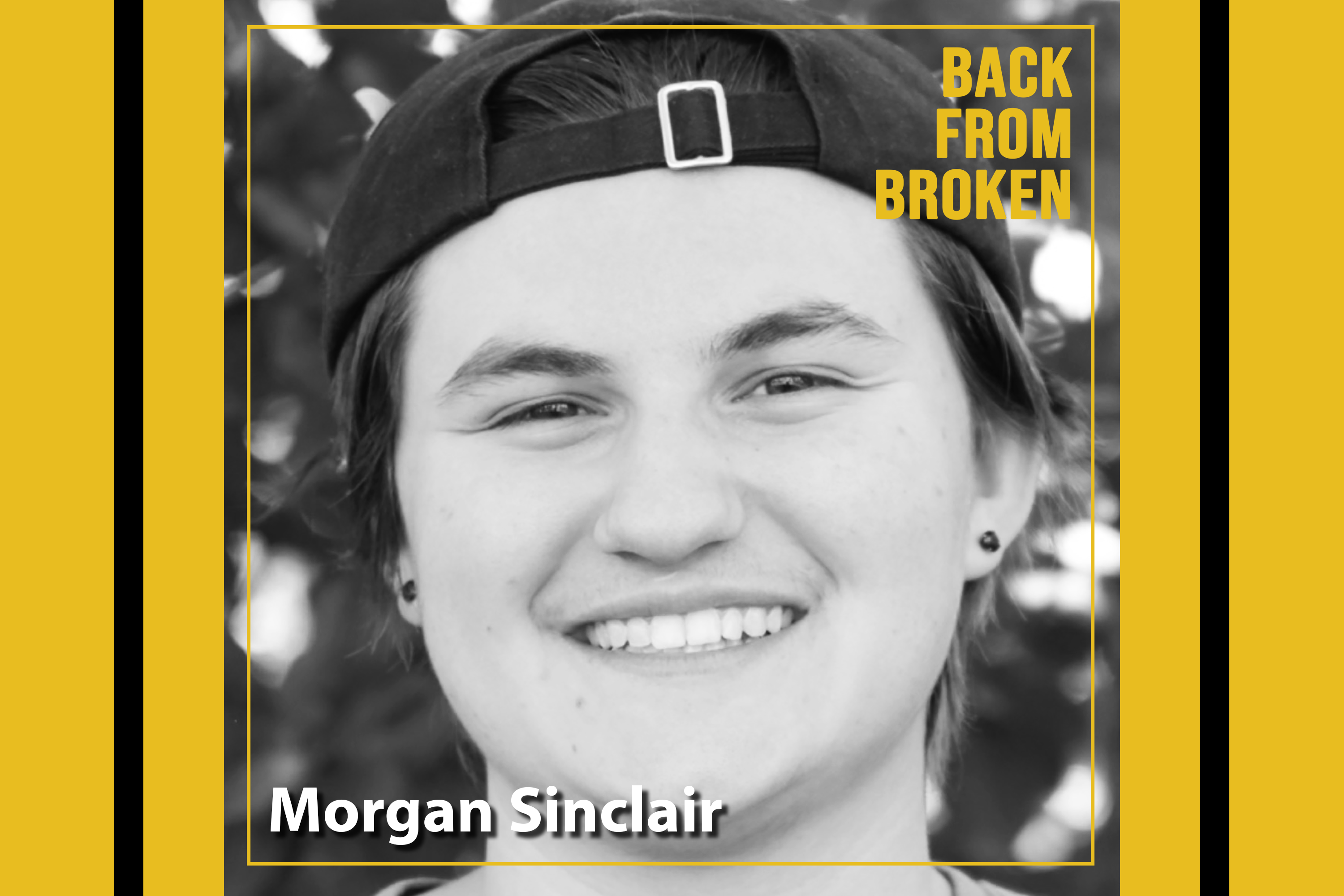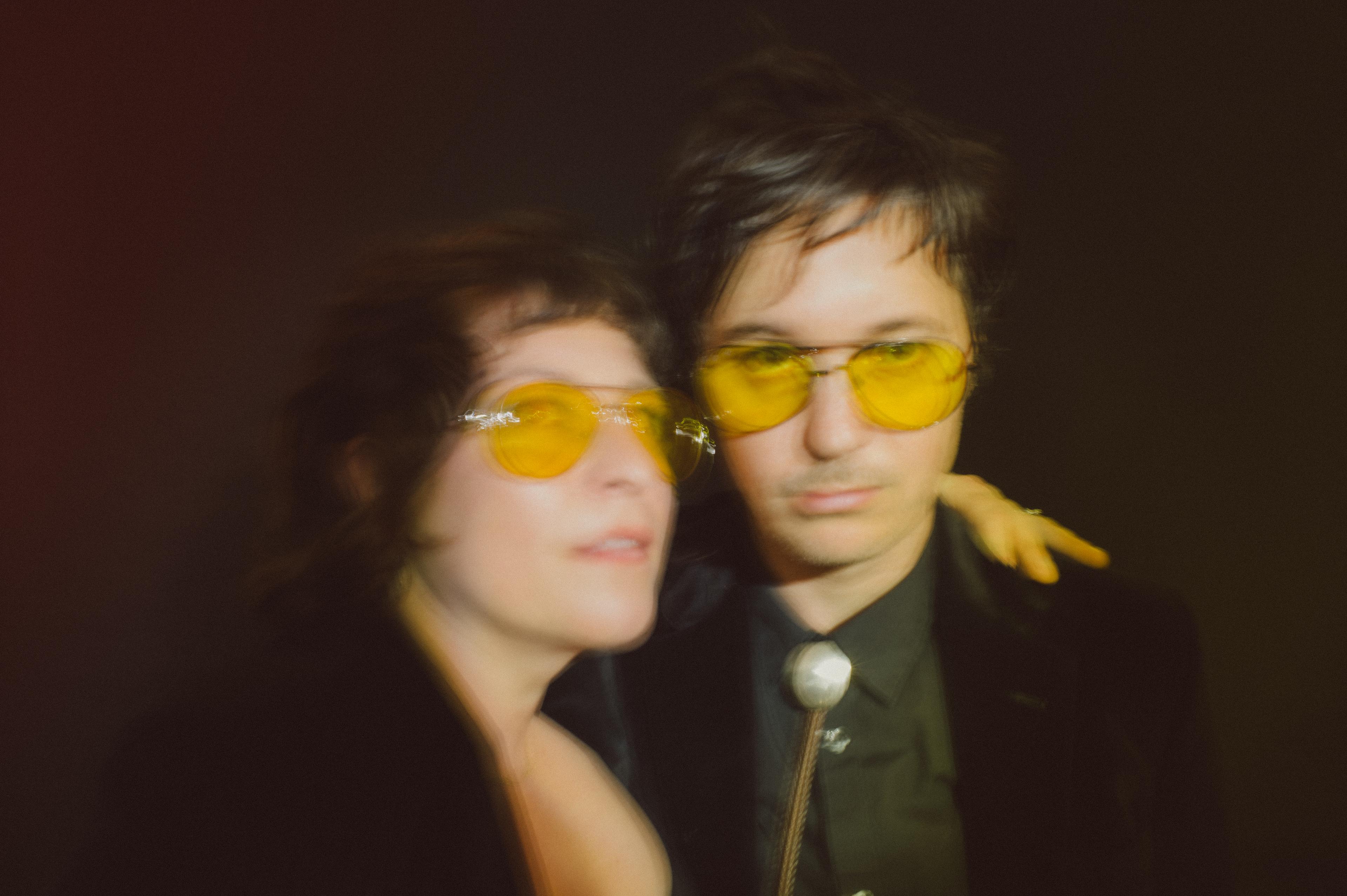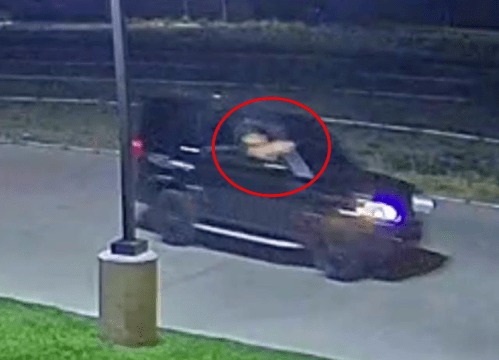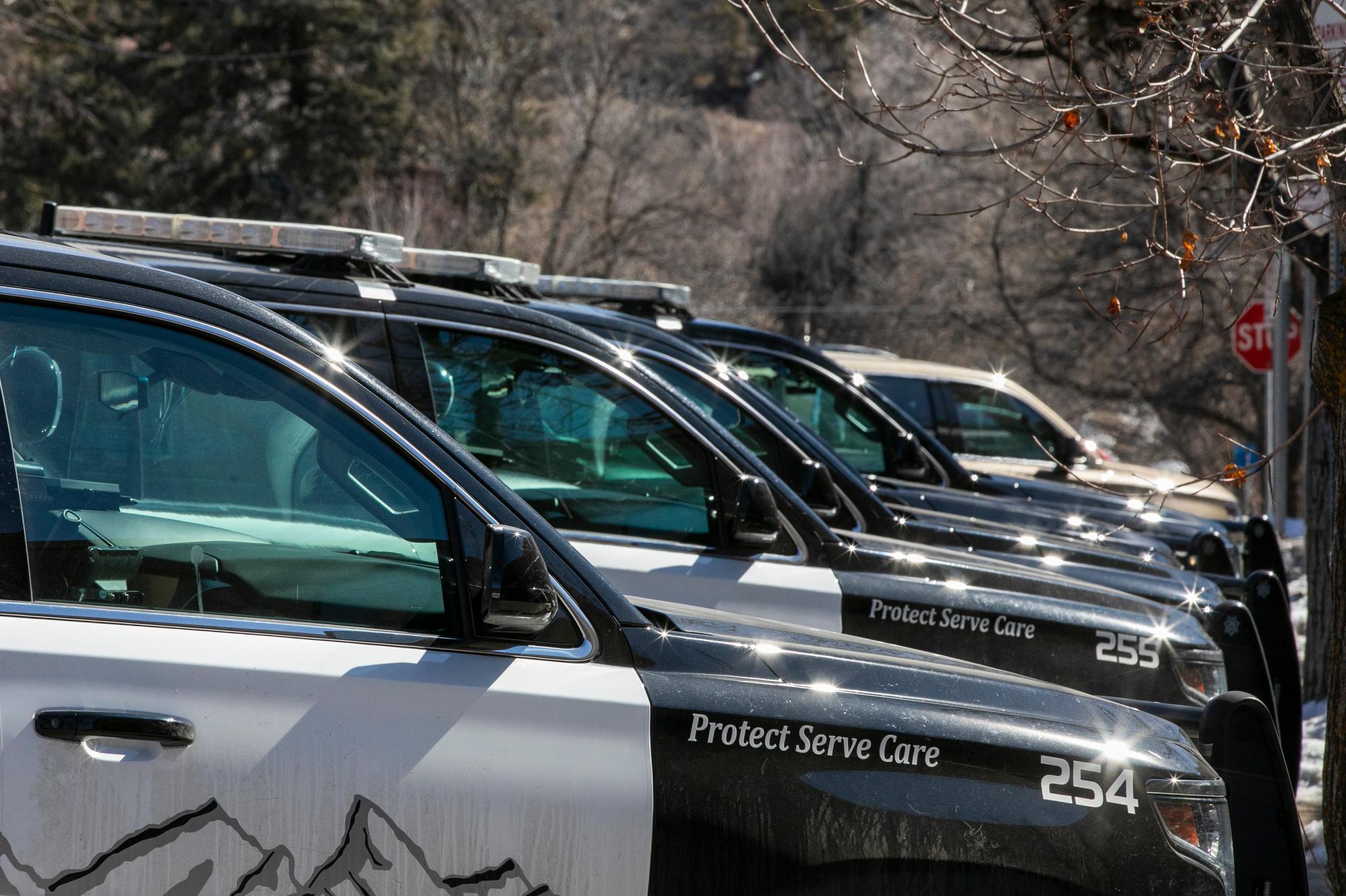
Morgan Sinclair wrestled with his identity as a trans man growing up. He turned to drugs to numb his feelings, and struggled with addiction. As a teen, he found a way to break free through rehab, as well as Denver's unique 5280 High School. Now, at age 19, he's four years sober, out and proud -- and has his whole life ahead of him.
Back From Broken is a show about how we are all broken sometimes, and how we need help from time to time.If you’re struggling, you can find a list of resources we've compiled at BackFromBroken.org.
Host: Vic Vela
Lead producer: Jo Erickson
Editor: Erin Jones
Additional producers: Rebekah Romberg, Luis Antonio Perez
Music: Daniel Mescher, Brad Turner
Executive producers: Brad Turner, Rachel Estabrook
Thanks also to Kevin Dale, Hart Van Denburg, Jodi Gersh, Clara Shelton, Matt Herz, Martin Skavish, Kim Nguyen, Arielle Wilson.
BackFromBroken.org
On Twitter: @VicVela1
Transcript
Vic Vela:
Hey, it's Vic with a quick note. This episode contains discussion of suicide. Please be advised.
In 3, 2, 1.
Morgan Sinclair:
Middle school was horrible. I feel like it is for most people, maybe not all, but…
Vic:
Oh God. Yeah.
Morgan:
…[Laughter] Yeah. Horrible time in life. But that was definitely when, you know, puberty hit. Everybody's figuring themselves out. But that was when I kinda realized that I was transgender. I mean, at the time I shoved it so far deep into my mind that, like, I didn't even think about it all that often.
Vic:
Was it kind of lonely? Like you didn't – I remember I knew I was gay at a very young age. And I'm a lot older than you. [Laughter] And back then I grew up in a small town as well. And back in the eighties and nineties, it – you know, being gay wasn't as, you know, socially accepted, right? As it is these days. But I remember, I knew that I was gay. I knew I was attracted to other boys, but I just – I couldn't talk to anybody about those feelings.
Morgan:
Yeah. I couldn't either. I mean, I remember looking in the mirror and being like, “Something. Something isn't right here.” And I would actually go on my phone and pull up the private browser on Safari and search up like transgender facts and all this stuff on it and then exit out of it and never speak of it.
Vic:
I'm sure a lot of you listening can relate to someone having bad memories from when they were a teenager in school. There's a lot of pressure to fit in. There's cliques – you know, the cool kids, the jocks, the nerds, things like that. But Morgan Sinclair felt like he didn't belong at all. You see when Morgan was born, his sex assignment was female. He's identified as a transgender male for a while now, but before Morgan learned to love who he is, he was on a dangerous path. Morgan, who's now 19, became addicted to drugs when he was just 13. And his story can teach us a lot about how hard it can be to accept who we are.
I'm Vic Vela. I'm a journalist, a storyteller and a recovering drug addict. And this is “Back from Broken” from Colorado Public Radio. Stories about the highest highs, the darkest moments and what it takes to make a comeback.
Morgan Sinclair had a typical middle class upbringing in the Denver suburbs. He had two loving parents and a younger brother who was the perfect playmate.
Morgan:
We'd hang out all the time. Since I didn't have many friends, he was kind of like my go-to for a while. And we would just do the normal stuff. Play video games, run around the backyard.
Vic:
Yeah.
Morgan:
Yeah. Wrestle. Stuff like that.
Vic:
Morgan loved playing with boys and hanging out with his brother. Then one day Morgan told his grandma something.
Morgan:
When I was four, around when I was four, I don't know. But my dad actually told me this when I came out, ‘cause I don't remember this. But I was, like, just talking to my grandma. And I was like, “Hey Grandma, I think I'm a boy.”
And she was like, “No, you're not,” and tried to explain it to me.
But I was like, “No, I'm a boy.” And she just let it go after that. But I just thought it was funny.
Vic:
That is – well, what made you say that? “I'm a boy.”
Morgan:
Honestly, when I was that age, not quite sure. I mean, definitely all through growing up, I had wished I was. And when I was four, I didn't know what being transgender meant or if, like – I didn't even know what that was. I'd always just wanted to fit in with the guys more often than the girls. I think I just was saying that ‘cause, like, that's what I had hoped I guess.
Vic:
Would you say when you were younger, you were doing more things that typically more boys would do?
Morgan:
Oh yeah. I was playing football, tackle football, with all my guy friends. Wrestling – not real wrestling, but just play wrestling. Yeah. Yeah.
Vic:
Yeah. There's that old word. You remember that word tomboy?
Morgan:
That's what I used to get called.
Vic:
[Laughter] Who called you that?
Morgan:
Everybody.
Vic:
Morgan knew he was different. He didn't dress like a girl and he didn't feel comfortable in his own skin. And he was determined to bury his emotions because desperately he wanted to belong. By the age of 12 Morgan started skipping classes and locking himself away in his bedroom. The only thing that kept him from total despair was watching YouTube clips where Morgan would learn more about transgender people.
Morgan:
I mean, I kinda used YouTube as an outlet to feel less alone because it was very lonely being in my bedroom by myself for like all the hours of the day that I wasn't at school. I mean, sometimes I would just kind of cry in my room ‘cause I was sad and alone, but YouTube did help me out a lot with that. And just feeling like I was a part of something, which is interesting now that I think about that.
Vic:
I mean thank God, though. Right? At least you had something to look at and kind of point at and say, this is – it's okay to feel like this. Yeah. When did drugs and alcohol kind of start entering the picture for you?
Morgan:
When I was 12.
Vic:
Okay.
Morgan:
In eighth grade, I was friends with this guy named Ali and Bennett and they kind of told me, “Hey, we met this guy and he smokes weed, and we're going to hang out with him later. Do you wanna come or whatever?” And I kind of, like, was begging them to let me go. And then I went there with about eight other guys that were there, and he had bought like an ounce of weed. It was like a lot for my first time ever smoking or seeing weed at all, actually. And that was the first time I ever did anything.
Vic:
What did – how did it make you feel?
Morgan:
Awesome. Yeah.
Vic:
Yeah. I mean, that's why they call it getting high, right?
Morgan:
Yeah. It was like something was missing, and that's what was missing. I've heard people describe it like that, and that's exactly how it feels. It's just that I've found this piece of me that I was missing for as long as I could remember. And instantly I was like, this is what I'm gonna do for the rest of my life.
Vic:
Morgan dug deeper into this lifestyle. He would sleep all day and skip classes and he would self-medicate his loneliness by experimenting with harder drugs.
You were starting to kind of get into harder drugs, and the LSD wasn't – it wasn't as fun. Right? Like it was getting harder to be on LSD. Then what made you keep going toward other harder drugs like Molly and coke and things like that?
Morgan:
Well, actually I think the only thing – well, not the only thing, but the biggest thing – that kept me trying different things and doing different things, was that getting high and like doing drugs, whatever they were, was like the only thing that I found fun for a while. And it was the only thing that I enjoyed. And it was the only thing that made me happy. So I wanted to chase anything that would get me to a point of happiness that I thought I wanted to be at.
Vic:
But the drugs were starting to change Morgan's attitude and personality. He was arguing with his parents more, and people were noticing the changes at school.
Morgan:
There's this one specific memory that I have going into my sign language class after lunch, after I'd gotten high. And my sign language teacher tried to take my phone, and I completely started, like, screaming at her. I told her to fuck off basically. And then she sent me to the principal’s office and I ended up just going in there and secretly like swiping my phone back from the basket and leaving. But I was constantly getting in arguments with all of my teachers.
Vic:
Why do you suppose that was going on?
Morgan:
I mean, they were just kind of asking me to do what I was supposed to be doing. And my perspective on school was like, this is literally the worst thing in the world. And I hate being here and I just wanna get high. And I hated when people told me what to do. So I'd kind of just fight back with everything.
Vic:
It's really amazing how – yeah, I had the same thing going on. Lots of drugs, lots of booze. Lots of – I hated authority. I could not – don't tell me what to do. Don't. Teacher, cop, you know, whoever you are, don't even do, don't even go there, or else I'm gonna blow up. I know now that it was, there was a lot of pain. And would you say pain was at the root of yours?
Morgan:
Yeah, a hundred percent. ‘Cause at the bottom of everything, like the reason I was getting high, was because I was so unhappy with who I was and what I was doing and just everything about myself I hated.
Vic:
Morgan became more secretive. He didn't want to talk to his parents or his brother about anything. He just couldn't face the constant screaming matches with his parents over his choice of friends or where he had been all night. And he definitely wanted to hide his drug use.
Morgan:
Well, at first I made all these little hiding spots in my room. I would cut open this huge stuffed animal I had and like shove the drugs in the middle of it and just kind of put it right next to my bed. I would put weed especially in deodorant bottles, like empty ones, but with a little bit left, like you wouldn't be able to smell it. And, yeah.
Vic:
Wow. Really [unintelligible] [laughter].
Morgan:
[Laughter] Yeah. I had a lot of very crazy hiding spots. I had a tapestry on my ceiling that I put it like in between the tapestry and the ceiling.
Vic:
Well, you're better than I was. I would plan on trying to hide something, and then I would just pass out and leave it all on the table. [Laughter] So yeah.
Morgan:
Strategic with it.
Vic:
And there was one more secret Morgan couldn't face: his identity. Every day it was getting harder and harder for him to look in the mirror. He hated the mere sight of his body and tried to hide it at every opportunity.
Morgan:
I still was extremely insecure, and I extremely, like, hated myself. And I kind of just really, really wanted this, like, quick fix that wasn't possible. ‘Cause it takes time and that's all right. But it was just, it was such a relief to be able to even just wear t-shirts or not like 15 layers of clothing because I – I don't know if you know what binders are.
Vic:
Please explain.
Morgan:
Okay. So a binder is, like, basically a really tight bra that squeezes everything in and makes your chest look flat. But at the same time, it also suffocates you, and I hate tight clothing. So I was never really able to wear a binder. ‘Cause it just made me more uncomfortable actually. I mean it helped with the dysphoria that I was having, but I could barely breathe and I was just super uncomfortable. So I tried layering up and like wearing a shirt, a long sleeve jacket, [unintelligible] flannels, like the whole nine yards. And still was super insecure, but I mean it helped a little bit.
Vic:
Morgan fell into a deep despair, and his drug use was getting more dangerous.
Morgan:
I went to this concert and took a bunch of acid and drank a bunch of alcohol and ended up blacking out and wandering somewhere. And I think I passed out and I, I don't really remember at all. But someone found me and called an ambulance. And all I remember is waking up the next day in the hospital with my mom. And after that, I didn't really care.
Vic:
But his parents did care. They made Morgan go to rehab even if he didn't want to. And Morgan didn't know it at the time, but he'd soon realize that what happened at the concert that night would prove integral to his recovery. That's coming up after the break.
Here's something that gets asked a lot of people in recovery: what does rock bottom look like? For Morgan, passing out on drugs at a concert was certainly a wake up call.
Morgan:
Oh yeah. It was honestly one of the scariest experiences that's ever happened to me probably. In my brain, like – and I don't know how to describe this. But in my brain, like on acid, I thought that I was dying and I had this whole trip that I was getting killed and like had surgery done on me while I was awake and, like, could feel it. Like, all this crazy ass shit. But in real life I was just, you know, wandering the streets of Boulder, which is, you know, probably just as scary being by myself and at the time a female who was 15.
Vic:
You weren't feeling suicidal or anything?
Morgan:
I absolutely was.
Vic:
Yeah?
Morgan:
Yeah. All throughout my drug use. But every day, yeah, I did. I did wanna die.
Vic:
You know, what emotions come to mind when you kind of go back and think about what that was like back then?
Morgan:
Honestly, just hopelessness is the biggest one that I think about. Like I genuinely felt hopeless and like things were never gonna get better. And I honestly didn't see myself making it past 18. Not that I had any plans to ever kill myself, but I just had kind of hoped that something would happen and I would die, which is really sad.
Vic:
No, but it's also, you know, it's something I've, I've heard many times before of people in recovery is that we – it's not that I actively had some sort of plan to take my life. But if I took too many drugs and overdose, well then so be it.
Morgan was 15 years old when he started an outpatient program at Cornerstone, a rehab center for young people and their families. It was different from how he imagined.
Morgan:
Well, it was the complete opposite of what I thought it was gonna be when my parents told me I was going to rehab. I thought I was gonna walk into like white padded cells. But I, [laughter] yeah, but I walked into the front office of their building, which is just a few offices, and then talked to the head counselor there for a little bit. And he was trying to get me to like, be honest about how much drugs I was doing and all that. And I was like, “Oh no. I'm just smoking weed on the weekends. There's no need for me to be here.”
Vic:
You weren't ready to be honest.
Morgan:
Oh definitely not. Not that day. And then after he talked to me for a while, I saw this board with the steps that we work there, which is pretty much the AA steps, but just, just a little different. And I was looking at those and I was reading through 'em and I was like, what the hell is this shit? Like, I'm not gonna believe in no God, like – none of that stuff. And then he walked me to the back part, which is basically just a big warehouse with couches, basketball hoops, a bar – of course with just sodas and stuff – and a foosball table and a bunch of people just having fun and yelling and running around. And I mean, I was like taken aback. I was like, where, where am I? Who are these people? What's going on? [Laughter] This is not what I expected. And then a few people actually ran up to me and were like, “Oh my God, hi.” Like, “What's your name?” Like, “What are your drugs of choice? How old are you?” Like, asking me all these questions about myself.
Vic:
I mean, this sounds like this was, Morgan, the first time in your life that you – that there was people expressing genuine camaraderie toward you.
Morgan:
Yeah, absolutely. It was the first time other than my parents that I would genuinely say that I've felt loved. And like people actually gave a shit about me. And this girl I met who ended up being my sponsor for about two and a half years was like screaming at me and was like, “Please let me pick you up from school tomorrow. And we'll like, hang out and have fun and go do stuff.” It was good. And I'm really glad she picked me up.
Vic:
Though Morgan liked Cornerstone, he had problems letting go of his old life. About two weeks into his rehab program, Morgan saw his coke dealer and they got into a fight.
Morgan:
He slapped me across the face because I had snitched on someone in the program to my outpatient counselor who was getting high. And then my best friend at the time sitting there watched the whole thing. Basically it was kind of like, “What the fuck is wrong with you, Morgan? Like, why the fuck would you ever do that? Like, you're a piece of shit,” whatever. And in that moment I could hear my outpatient counselor's voice in my head telling me that these people don't really care about me.
Vic:
Morgan felt awful about telling his counselor about a student in the recovery program using drugs, but he was more angry at himself for meeting up with his so-called friends.
You know, one of the hardest lessons in, especially in early recovery is, is you learn who your friends are pretty fast.
Morgan:
Yeah, I did. I learned pretty quickly at two – two, three weeks in.
Vic:
Not all of 'em of course. There's wonderful people. But you know, you'll pretty soon find out the people who, unless there's drugs and alcohol involved, they don't really want to have anything to do with you.
Morgan:
Right.
Vic:
I mean, that was kind of some tough love. And so now you, you're hearing your counselor's voice in your head at that time. And, and so now it's like, is it starting to sink in?
Morgan:
Yeah, absolutely. I was like, I need this. Yeah. I mean, I started showing up to outpatient every day on time. I'm actually – that's a lot. [Laughter] I've never been good at being on time. I really tried to be on time. But when I was there, I listened and I participated and talked to people about my problems and got honest and vulnerable.
Vic:
And it was working.
Morgan:
And it was. It started working.
Vic:
Who knew?
Morgan:
Crazy [laughter].
Vic:
Yeah. That's actually – what they tell you to do is working.
Morgan:
I know [laughter].
Vic:
After six months at Cornerstone, Morgan attended 5280 High School, a school that specializes in holistic wellness. It was hard for Morgan to adjust to the change at first.
Morgan:
Well, it was difficult in terms of the fact that I had gotten out of outpatient when I started 5280 and kind of stopped doing the work. I stopped putting the effort in. But I genuinely believe that if I did not have 5280 High School, I would not have stayed sober. And who knows what that would've looked like. 5280 kind of gave me the support and the accountability that I needed to stay sober.
Vic:
As time went on, Morgan felt more comfortable at his new high school. He was meeting new friends and was gaining more confidence. And at a difficult time in his life, when he had just broken up with his girlfriend, he knew he had to be true to himself.
Morgan:
It was something that I had kind of been thinking about, and I kind of realized that there was no hiding it anymore. And like, that was the, that was just something that I needed to do for myself to be happy with myself and in my body.
Morgan:
And so I ended up telling one of my best friends at the time – her name's Gwen, still one of my best friends – but ended up telling her, like, bawling, crying, “I'm trans.” And like, “I don't know how to deal with this.” And like, “I don't wanna deal with this.” And I was kind of just like, “I just might not deal with this and pretend it doesn't exist.”
And she was like, kinda just like, “I know. I had my suspicions.” Which is always such a funny response to me and kind of made me laugh a little bit. ‘Cause everybody knew but me.
Vic:
Yeah. Yeah. That's always, always the case. Yeah. When I came out to my – I got drunk, and I got my friends drunk, and I pulled them in my room at my high school graduation. I said, “I gotta tell you guys something. I, I have some news: I'm gay.” And they all just kinda looked at me and looked at each other like, okay, so what's the news.
Morgan:
Yep.
Vic:
And, and it's like, you're always the last one to know, right.
Morgan:
Exactly [laughter].
Vic:
So what, did that make you feel better though? That, okay, well, this person knew already and this person is still my friend.
Morgan:
Yeah. It definitely made it just a little, little bit better. ‘Cause one of my fears with coming out to people and with coming out to my friends and my family was that I wasn't gonna be accepted and that they weren't gonna wanna be my friends anymore or wanna associate with me or anything. So knowing that she still loved me just the same was reassuring in a way for sure. And it gave me the confidence to come out to my other close friends at the time.
Vic:
Yeah. I guess, you know, everything that you've gone through – what are some of the challenges in terms of struggling with addiction in mental health that is unique to the trans community?
Morgan:
I mean it's a whole different ball game if I'm being honest. ‘Cause being trans and already having a lot of issues with like, myself, and just being super self-conscious and insecure and, like, hating myself off the bat without already trying to, like, deal with all this trans stuff, made it really, really hard in that aspect. ‘Cause I think – and I can't speak for everybody, but I can speak for myself and the people I've talked to – loving yourself is already such a hard thing as a drug addict and kind of already gets the ball rolling to begin with. But then when I added on all of this stuff, being trans and coming out and like figuring all that out, it just made it substantially worse.
Vic:
That's gotta be so hard, you know?
Morgan:
Yeah. I mean I'd honestly say dealing and learning how to be trans and being happy with the way that I am is, in my opinion, harder than getting sober. And I did it with two years of sobriety, which, you know, isn't like the most time in the world, but I definitely wasn't emotionally fucked at that point.
Vic:
Yeah. You, well you had to take care of one thing before you took care of the other thing.
Morgan:
Yeah.
Vic:
I mean otherwise I'm sure it would've been overwhelming.
Morgan:
Oh, a hundred percent. I mean, I, I truly believe that if like things had been different and I came out when I was getting high or maybe even when I was newly sober that I would, I would still be getting high or I'd be dead, really.
Vic:
Well, how do you feel about yourself today?
Morgan:
Much better.
Vic:
That's great.
Morgan:
Still I struggle. It just depends on the day. I was able to start hormone treatment in October of 2020. I was able to get top surgery in May of 2021. Which made everything like 10 times better. And I plan to continue on like with bottom surgery and continuing hormones and all that stuff, which is such a long process. But being able to get top surgery was a turning point for me in my happiness with this stuff. ‘Cause every day, like, I woke up, looked down, hated myself, and tried my best to hide it up.
Vic:
I mean, it sounds like that was just like the weight of the world lifting off of you. I mean first you get sober, and then you're transitioning, and all of a sudden you're feeling like who Morgan really is.
Morgan:
Yeah.
Vic:
Morgan Sinclair is now four years sober. And the school he attended, 5280 High School?
[SOUNDBITE INSIDE 5280 HIGH SCHOOL]
Unnamed student:
I got some, I got some.
Vic:
…Well, he now works as a recovery coach there.
[SOUNDBITE INSIDE 5280 HIGH SCHOOL, YOUNG PEOPLE LAUGHING, GREETING EACH OTHER]
Morgan:
Lindsay [laughter].
Unnamed student:
Hey Morgan.
Morgan:
Hey Kate.
Unnamed student:
Hey Morgan.
Morgan:
Hey Kate [laughter]. I'm good. How are you? [Laughter, unintelligible responses from young people.]
Vic:
Morgan loves his job. He really enjoys always helping other young people who are struggling just like he used to.
Morgan:
At points it's really hard because it's like dealing with a bunch of me everywhere all the time. [Laughter] Yeah. Yeah. But it's, it's really awesome actually. And I really enjoy it. As much as sometimes I like to say that I don't and it's hard, deep down I really, really enjoy it. And I love being able to give to people what I was given – freely given – by people who were my recovery coach or like my sponsors. Like, I don't know. I just love being able to give people that support in the place that I feel usually is the hardest. Especially being 15 and in recovery, high school is like a horrible place to be. So being able to make people feel comfortable with their journey in recovery and, like, being in high school and being able to help them be successful even though I'm like, I've never been good at school is – it's super cool.
The second that I was able to come out as trans and be myself, it was like, I wasn't pretending anymore. And I was able to, like, truly be happy and learn how to be happy within the person that I am. But also there's this saying in my program, also probably in AA, that I love to say, and it's, “Don't quit five minutes before the miracle happens.”
And I say that because it's not hopeless. And there is so many resources out there for people like me, especially 5280, Cornerstone, and Full Circle. I've seen all those programs exponentially change people's lives and, and save their lives. So I guess just don't give up hope and be yourself, which is super cheesy, but very real.
Vic:
Don't quit before the miracle happens. Yeah.
“Back from Broken” is a show about how we're all broken sometimes and how we need help from time to time. If you or someone you know are struggling with addiction, you can find a list of resources at our website backfrombroken.org. “Back from Broken” is hosted by me, Vic Vela. Our lead producer today was Jo Erickson. Find a list of everyone who helped make this episode in the show notes. This podcast is made possible by Colorado Public Radio members. Learn about supporting “Back from Broken” at cpr.org.








